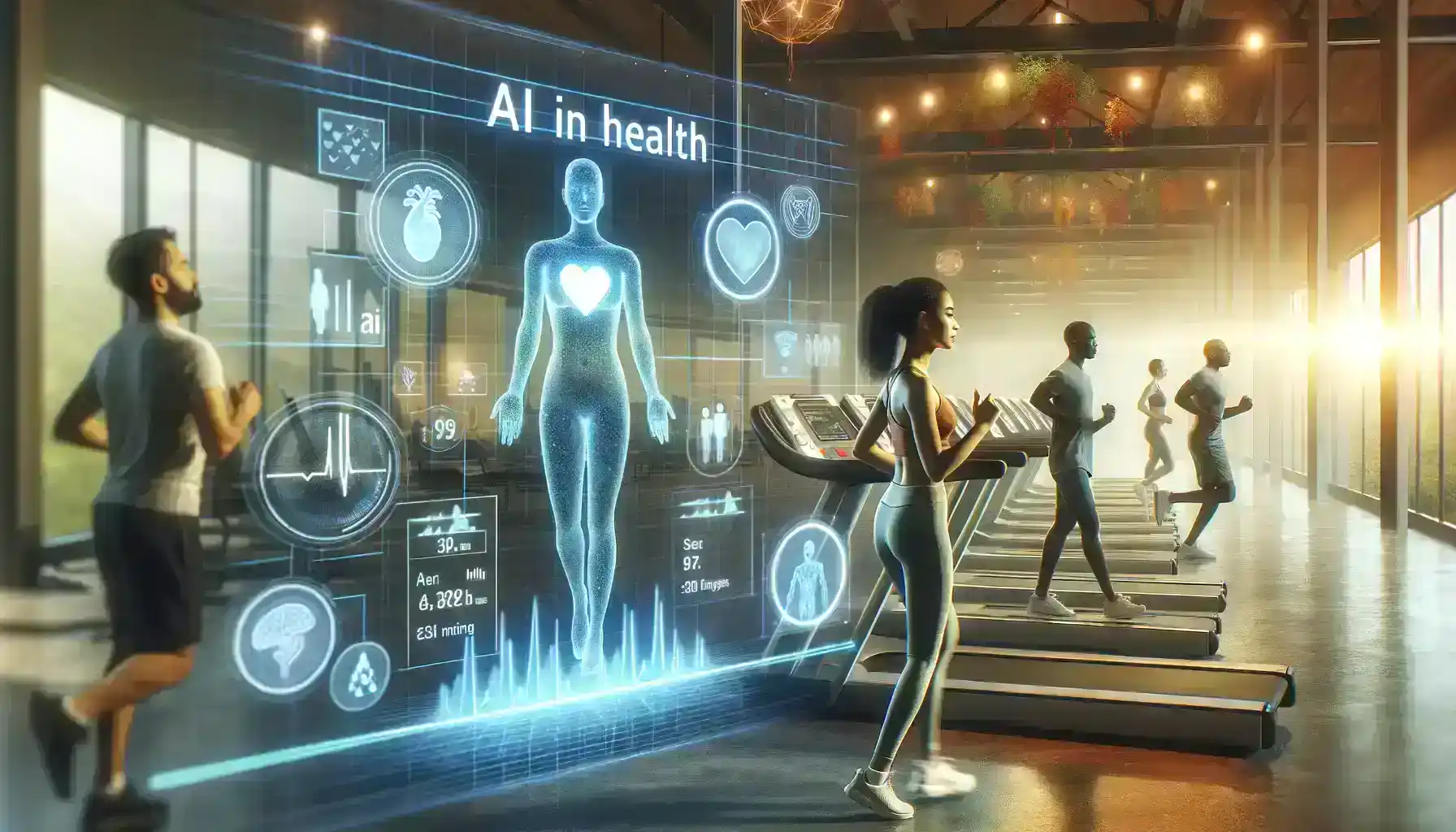Table of Contents
In the era of unprecedented technological advancements, Artificial Intelligence (AI) stands out as a revolutionary force, particularly in healthcare. From wearables to wellness for AI in Health, it is reshaping the landscape, ushering in a new era of proactive health management and preventive care.
Introduction
The fusion of AI and healthcare is a paradigm shift, promising not just treatment but proactive well-being. This article digs into the multifaceted role of AI in health, exploring real-time examples that showcase its transformative impact.
1. Wearable Technology as Health Sentinels in AI in Health
Wearable devices have become ubiquitous, transcending mere fitness trackers. AI algorithms embedded in wearables analyze data points, providing real-time insights into an individual’s health.
Ubiquitous Presence: Wearable devices have evolved beyond basic fitness trackers, becoming an integral part of daily life. For instance: Smartwatches, fitness bands, and other health-focused wearables.
Integration of AI Algorithms: AI algorithms are embedded within wearables, enabling sophisticated data analysis. For instance: Apple Watch Series and Fitbit employ advanced AI algorithms for health monitoring.
Real-Time Health Insights: Wearables continuously analyze diverse data points in real-time, providing instant health insights. For instance: The Apple Watch monitors heart rate, and activity levels, and even conducts ECG readings.
Vital Sign Monitoring: Wearables track vital signs, offering a comprehensive overview of an individual’s health. For instance: Fitbit measures heart rate, sleep patterns, and other vital metrics.
Alerts for Timely Intervention: Wearables go beyond data collection, alerting wearers and healthcare providers when anomalies are detected. For instance: Apple Watch notifies users of irregular heartbeats and can alert emergency services if necessary.
Apple’s Contribution: Apple’s Watch Series is a prime example of AI-powered wearables making a significant impact on health monitoring. For instance: The Apple Watch Series 6 introduced a Blood Oxygen app, providing users with insights into their respiratory health.
User and Healthcare Provider Collaboration: AI in Health in terms of Wearables bridges the gap between users and healthcare providers by facilitating real-time data sharing. For instance: Wearable-generated health data can be integrated into electronic health records, enhancing collaboration for better-informed decisions.
Future Implications: The continuous evolution of AI-driven wearables holds promise for even more sophisticated health monitoring. For instance: Ongoing research and development in wearables aim to introduce new features, such as early detection of specific health conditions.
Wearables equipped with AI algorithms have transcended their initial roles as fitness trackers. For instance, companies like Apple and Fitbit showcase the transformative impact of these devices, not only in monitoring vital signs but also in actively contributing to proactive health management. The real-time insights these wearables provide mark a significant stride towards a future where personal health is continuously monitored and potential issues are proactively addressed.
2. AI in Health: Diagnostic Revolution: AI in Imaging

Enhanced Image Analysis: AI algorithms excel in processing and interpreting medical images, enhancing the precision of diagnostics. Companies like Aidoc leverage AI for radiology, detecting abnormalities in CT scans, X-rays, and MRIs with high accuracy.
Early Disease Detection: AI’s ability to identify subtle patterns and anomalies contributes to the early detection of diseases. Qure.ai is, for instance, employing AI in health algorithms to detect abnormalities in chest X-rays, aiding in early diagnosis of conditions like tuberculosis and lung cancer.
Efficient Workflow: Artificial Intelligence streamlines the diagnostic workflow by automating image analysis, reducing the time required for interpretation. Zebra Medical Vision is known for its AI algorithms that analyze various imaging modalities, assisting radiologists in detecting multiple diseases efficiently.
Precision Medicine Applications: Artificial Intelligence in imaging supports precision medicine by tailoring treatments based on precise diagnostic insights. Companies like PathAI use AI to analyze pathology images, contributing to personalized treatment plans in oncology.
Large-Scale Screening Programs: Artificial Intelligence enables large-scale screening programs, enhancing population-level health initiatives. Google Health’s DeepMind is notable for its work on AI algorithms that analyze retinal scans, aiding in diabetic retinopathy detection for large-scale screening efforts.
Reduction in False Positives and Negatives: AI’s analytical capabilities contribute to a significant reduction in false positives and negatives. Arterys is an instance, of employing AI to assist in cardiac MRI analysis, improving diagnostic accuracy and reducing errors.
Telemedicine Support: AI in imaging supports telemedicine by providing accurate diagnostic information remotely. RADLogics utilizes AI for chest X-ray analysis, facilitating remote diagnostics and timely intervention, especially in critical situations.
Integration with PACS Systems: AI seamlessly integrates with Picture Archiving and Communication Systems (PACS), enhancing radiologists’ capabilities. EnvoyAI is known for its platform that integrates various AI algorithms into existing PACS systems, streamlining the adoption of AI in diagnostic workflows.
3. Personalized Medicine with AI in Health: Deciphering Genetic Data
Genetic Analysis for Individualized Treatment: AI algorithms analyze an individual’s genetic code. This analysis identifies specific genetic variations associated with diseases.
Tailored Treatment Plans: Based on genetic insights, AI recommends personalized treatment plans. Treatment options are aligned with an individual’s genetic makeup for better efficacy.
Benefits of Personalized Medicine: Treatment aligns precisely with an individual’s genetic profile, enhancing efficacy. Tailored treatments reduce adverse effects by avoiding medications with potential risks. Targeted interventions save time and resources by focusing on the most effective treatments.
Challenges and Considerations: Balancing privacy concerns and ethical considerations in handling sensitive genetic information. Ensuring secure storage and transmission of genetic data to prevent unauthorized access.
Future Implications: Personalized medicine through AI is likely to expand to various medical fields. Genetic insights contribute to more effective drug discovery processes.
The integration of AI in personalized medicine transforms healthcare by analyzing an individual’s genetic data. This approach, illustrated by IBM Watson Genomics, facilitates tailored treatment plans based on genetic predispositions, offering a more precise and effective approach to healthcare.
4. AI in Healthcare: Chatbots and Virtual Health Assistants

Enhanced Patient Engagement: AI-driven chatbots and virtual health assistants enhance patient engagement by providing instant access to information. Patients can ask questions, seek advice, and receive immediate responses, fostering a more connected and informed healthcare experience.
24/7 Availability: Virtual health assistants operate around the clock, ensuring continuous availability for users. This feature is precious for addressing queries, monitoring symptoms, and offering support outside regular office hours.
Mental Health Support: Virtual health assistants are increasingly designed to provide mental health support, offering a valuable resource for individuals dealing with emotional and psychological challenges. They can engage in conversations, offer coping strategies, and provide immediate assistance in crisis situations.
Woebot: It is an AI-powered chatbot focused on mental AI in health support. Utilizes natural language processing and cognitive-behavioral therapy principles to engage users in conversations. Offers real-time mental health support by guiding users through challenges, providing coping mechanisms, and facilitating self-reflection.
Efficient Triage and Initial Assessment: Chatbots assist in triaging patients by asking targeted questions to assess symptoms and urgency. This facilitates more efficient use of healthcare resources, directing patients to appropriate care based on the severity of their conditions.
Appointment Scheduling and Reminders: Virtual health assistants streamline administrative processes by helping users schedule appointments and send automated reminders. This contributes to improved patient adherence to treatment plans and reduces the likelihood of missed appointments.
Babylon Health: Employs an AI chatbot for healthcare assistance that offers symptom checking, provides health information, and assists users in booking virtual consultations. It also aims to enhance the efficiency of healthcare delivery by providing immediate guidance and connecting users with healthcare professionals when necessary.
Continuous Monitoring and Follow-up: Virtual health assistants can monitor patients’ progress and follow up on treatment plans. This continuous engagement supports long-term care management, especially for chronic conditions.
5. Remote Monitoring and Chronic Disease Management with AI in Healthcare
Enhanced Patient Monitoring: AI facilitates continuous remote monitoring of vital signs, allowing healthcare providers to receive real-time data. Enables the proactive identification of deviations from baseline parameters, prompting timely interventions.
Timely Interventions: AI algorithms analyze data trends to identify early signs of deterioration in chronic conditions. Healthcare providers receive alerts or notifications, enabling them to intervene promptly and prevent complications.
Personalized Care Plans: AI in Health can also analyze patient data to create personalized care plans tailored to the specific needs of individuals with chronic conditions. Offers a dynamic approach to care management based on real-time health data.
Reduced Hospitalizations: Proactive management and timely interventions can reduce the likelihood of hospital admissions. Remote monitoring with AI aims to keep patients stable and minimize emergency situations.
Philips HealthSuite: Remote patient monitoring and chronic disease management using AI.

How it works:
- Patients use connected devices to measure vital signs such as blood pressure, glucose levels, or heart rate.
- AI algorithms within the HealthSuite continuously analyze the collected data.
- Healthcare providers receive alerts for any abnormal trends or signs of deterioration.
- Enables virtual consultations based on real-time data, allowing for timely adjustments to treatment plans.
Benefits:
- Identifies potential issues before they escalate, enabling proactive management.
- Empowers patients to actively engage in their health, fostering a collaborative approach.
- Reduces healthcare costs associated with emergency interventions and hospitalizations.
Scenario:
- John, a patient with diabetes, uses connected devices to monitor his blood glucose levels.
- HealthSuite’s AI algorithms detect a trend indicating potential insulin resistance.
- John’s healthcare provider receives an alert and recommends adjustments to his insulin regimen during a virtual consultation.
- John’s condition stabilizes, and hospitalization is avoided, showcasing the efficacy of remote monitoring with AI.
6. AI in Health: Challenges and Ethical Considerations
Privacy Concerns:
- Challenge: The collection of sensitive health data raises concerns about how this information is handled, stored, and shared.
- Instance: Google’s Project Nightingale faced criticism for its partnership with Ascension, a healthcare provider, involving the transfer of patient data without adequate transparency.
Data Security:
- Challenge: Safeguarding healthcare data from breaches is critical to maintaining patient trust and ensuring the integrity of medical information.
- Instance: The WannaCry ransomware attack in 2017 disrupted healthcare services globally, highlighting vulnerabilities in outdated systems and the need for robust cybersecurity measures.
Ethical Decision-Making by AI:
- Challenge: The use of AI in decision-making processes, such as treatment recommendations, poses ethical dilemmas related to accountability and bias.
- Instance: In 2018, ProPublica investigated racial bias in an algorithm used in healthcare settings. The algorithm showed a bias against black patients, emphasizing the need for rigorous testing and unbiased training data.
Conclusion
AI in health from wearables to wellness, is a dynamic journey marked by innovation and transformative impact. As we navigate this evolving landscape, it is crucial to strike a balance between technological advancements and ethical considerations. The promise of proactive health management through AI is within reach, and its realization holds the potential to usher in an era of unprecedented well-being.
In conclusion, the transformative role of AI in health is not a distant future but a present reality. The instance cited underscores the tangible impact AI is having on wearables, diagnostics, personalized medicine, virtual health assistants, and chronic disease management. As we embrace these advancements, it’s imperative to remain vigilant, addressing challenges to ensure a future where AI truly empowers health and wellness for all.





